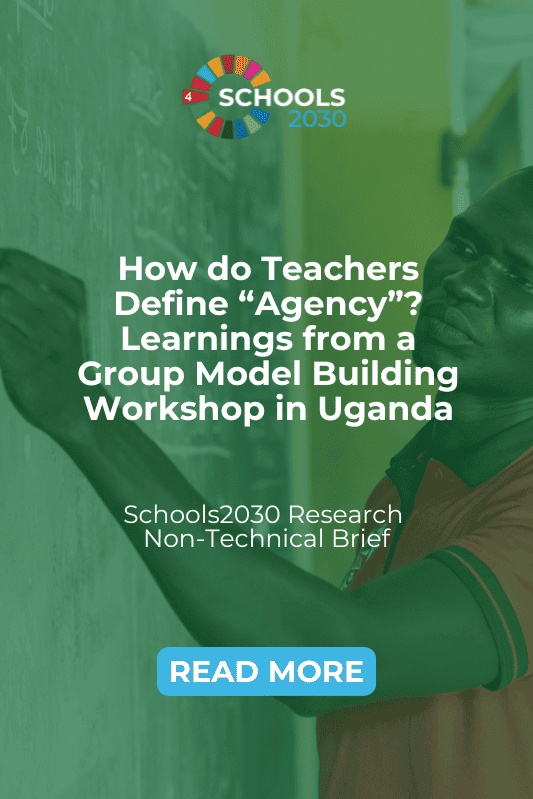OUR GLOBAL RESEARCH
School-driven evidence for systems-level change
Through the generous support of the Jacobs Foundation, Schools2030 is working with independent research partners to increase our understanding of how holistic skills are taught and learned at classroom level; what factors can explain variability in holistic learning outcomes; and how school-driven innovations in holistic learning can lead to wider systems and policy change.
Many of our research partners are organisations based in the focus countries. Through this model of research partnership, Schools2030 seeks to counteract the trend in international development and global education research that sees focal countries as sites of data extraction, with research outputs flowing overwhelmingly from and between western-based institutions. All of our research partners have articulated plans for stakeholder involvement and how they will share and even co-create the evidence they generate with schools.
We believe that building the evidence together with stakeholders will help us make the crucial link between education research and education systems change.
Our Research Footprint
Our Research Footprint
California, USA
Research Partner
University of California, Berkeley
The Netherlands
Research Partner
University of Amsterdam
Indiana, USA
Research Partner
University of Notre Dame Global Centre for the Development of the Whole Child
Italy, USA
Research Partner
UNICEF Office of Research – Innocenti
KAZAKHSTAN
Research Partner
Nazarbayev University Graduate School of Education
Kenya
Research Partner
Zizi Afrique
Kenya
Research Projects:
- Catalysing locally-rooted education solutions to improve holistic learning outcomes
- The Development of Picture Comprehension: Improving Learning Materials and Assessment Tools in Global Contexts
KYRGYZSTAN
Research Projects:
- Exploring school-based education stakeholders’ perspectives on quality of education in Kyrgyzstan and Tajikistan in the context of School2030 initiative
- Helping Teachers Reduce Inequality in Education
Ontario, CANADA
Research Partner
CIDEC at OISE University of Toronto
Pakistan
Research Partner
ITA Pakistan
Tanzania
Research Projects:
- The effect of common attributes of Design Thinking and Play-based teaching approaches on raising holistic learning outcomes at Primary school level in Tanzania
- ‘Data Must Speak’ about Positive Deviant Approaches to Learning
Pakistan
Research Projects:
- Catalysing locally-rooted education solutions to improveholistic learning outcomes
Tajikistan
Research Projects:
- Exploring school-based education stakeholders’ perspectives on quality of education in Kyrgyzstan and Tajikistan in the context of School2030 initiative
Tanzania
Research Partner
University of Dar Es Salaam
United Kingdom
Research Partner
Right to Play International
BRAZIL
Research Partner
School of Education, University of São Paulo
UNITED KINGDOM
Research Partner
Open Development & Education
TEXAS,USA
Research Partner
The University of Texas at Austin
BRAZIL
Research Projects:
- Action research and equity: effects on innovative school environments
UGANDA
Research Projects:
- Holistic learning for SEND students in Uganda primary schools
PAKISTAN
Research Projects:
- Mixed-Methods Research to Develop a Values-Alignment Approach for Holistic, Growth-Oriented Teaching Practices in Pakistan
Tanzania
Research Projects:
- Teacher Agency and Innovation in Tanzania (TAIT): Exploring and Advancing Change
Kenya
Research Projects:
- Emboldening pre-primary teachers with data to reflect and improve their classroom practices
- Quality education for all – strengthening tools and practices to support disability-inclusive learning environments in early childhood development and education (ECDE) settings in Kenya
Uganda
Research Projects:
- How does agency translate into action? Understanding the mechanisms of teacher agency and well-being in Uganda
Kyrgyzstan
Research Projects:
- Teacher agency as a driving force of educational change in Kyrgyzstan
India
Research Projects:
- Teacher Agency and Innovation: mixed methods study on systemic factors driving teacher capability in low-resource contexts
Schools2030
Research projects
Projects 2021-2023
Our inaugural Schools2030 Global Call for Research sought international researchers who could work alongside the teams and schools in the inception phase of the programme to help explore the impact it is having on learning and teaching – for example how holistic skills are taught, learned and measured, or what factors can explain variability in outcomes.
Catalysing locally-rooted education solutions to improve holistic learning outcomes in Pakistan and Kenya
SUMMARY
The project investigated the Schools2030 programme in two countries – Pakistan and Kenya – across 25 schools and 2 youth centres for a period of 18 months. The research aimed to contextualise and examine the relationship between academic learning outcomes, as offered currently in targeted programme schools, and non-academic skills as well as generate robust evidence on school leader and teacher-led interventions that effectively develop and incorporate non-academic skills into the existing schooling system. The research also explored the context-specific factors and mechanisms that may be driving or constraining effective implementation in both countries and what this may mean in terms of driving systems-wide change.
The effect of common attributes of Design Thinking and Play-based teaching approaches on raising holistic learning outcomes at Primary school level in Tanzania
PI/CO-PI:
Nikhit D’Sa
Simon Vendelin (Co-PI)
GEOGRAPHY:
Tanzania
SUMMARY
This unique research-practice partnership worked together with Tanzanian education officials and school communities to understand the effectiveness of key elements of the Design Thinking Approach and Play-based Learning, using measurement tools developed in close collaboration with children, parents, teachers and school staff in Tanzania. A contextualised SEL tool was co-created with these various actors, and then used with pre-primary and primary students across 4 districts in Tanzania to answer the central research question; “how are holistic learning outcomes impacted by the common attributes of Design Thinking Approach (DTA) and Play-based Learning (PBL) in Tanzania”?
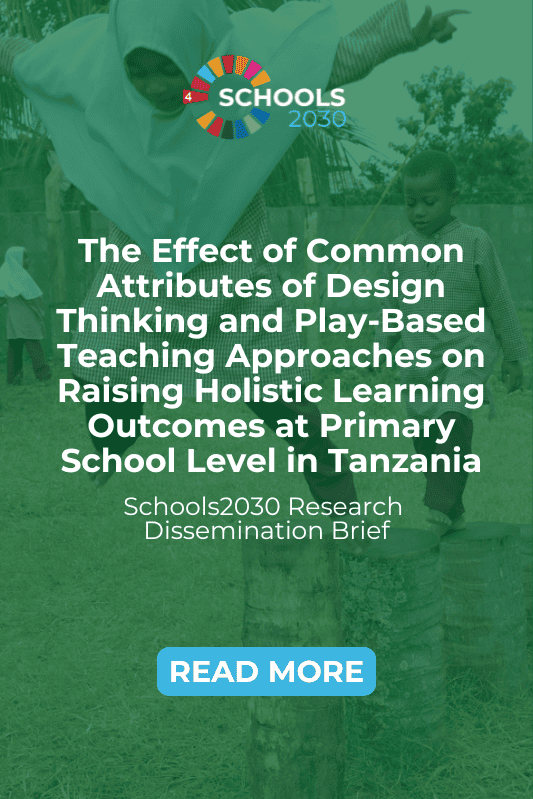

Exploring school-based education stakeholders’ perspectives on quality of education in Kyrgyzstan and Tajikistan in the context of the Schools2030 initiative
PI/CO-PI:
Duishonkul Shamatov
Mir Afzal Tajik (Co-PI)
Sarfaroz Niyozov (Co-PI)
GEOGRAPHY:
Kyrgyzstan, Tajikistan
SUMMARY
This two-year study sought to identify effective, culturally relevant classroom-generated practices and ideas for holistic learning that support efforts to change the current thinking on replicating and developing education solutions in countries like Kyrgyzstan and Tajikistan. The central objective was to identify context-relevant definitions of quality education by understanding the perspectives of teachers, students, school leaders, and parents and how ideas of quality are manifesting in the classroom. Findings were shared with other educators and researchers,to inform policy and approaches for improving holistic learning outcomes.
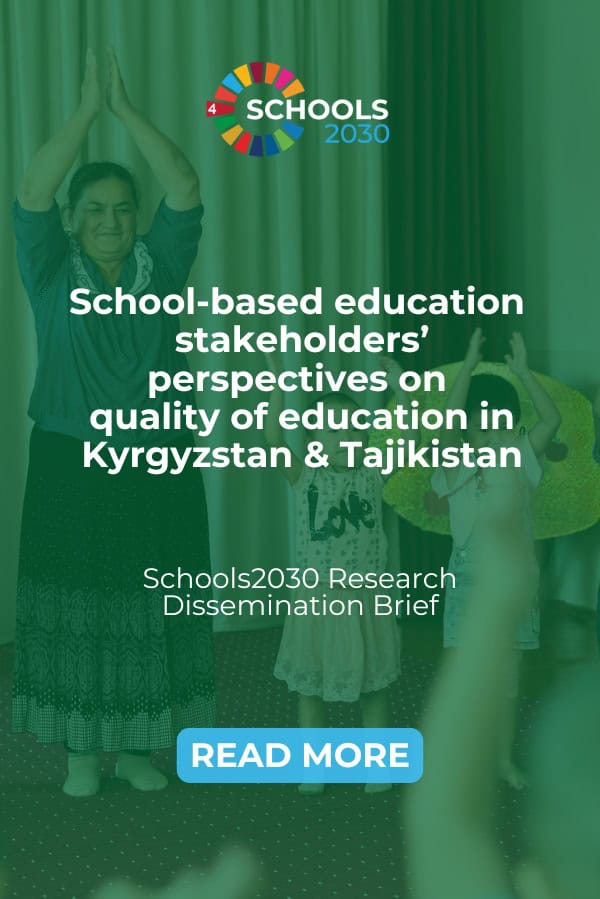
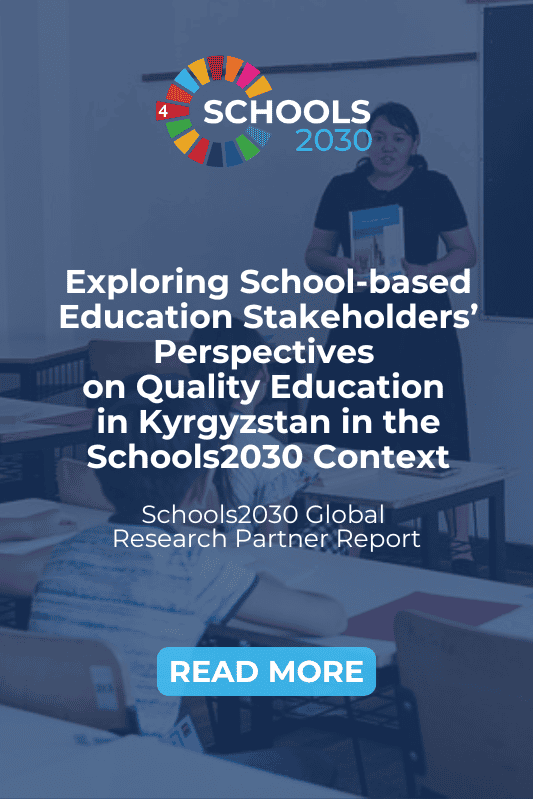
The Development of Picture Comprehension: Improving Learning Materials and Assessment Tools in Global Contexts
SUMMARY
Teachers and early childhood researchers frequently use learning materials and assessment tools involving picture stimuli, across many different cultures and contexts. However, it is unclear when and how young children across cultures and contexts begin to understand pictures. While children growing up in high-income contexts are often surrounded by picture-rich stimuli, children growing up in low-income contexts may have less experience with pictures or other kinds of visual symbols. Basic picture comprehension tasks were undertaken with children living in Lamu, Kenya, to help determine if children’s early experiences with pictures is related to their understanding of pictures. Overall, this research contributes to evidence on the most effective learning materials and valid assessment tools for children from diverse backgrounds.



‘Data Must Speak’ about Positive Deviant Approaches to Learning
SUMMARY
This project expanded a multi-country research initiative, known as Data Must Speak (DMS), to Tanzania. It responds to the need to address the global learning crisis in which more than half of children cannot read and understand a simple text by age 10, even when attending school. The project used “positive deviance” methodology to identify local behaviours and practices that make some schools achieve better results than others even though they operate in a similar context with comparable resource. Once identified, the project investigated actionable system, school, and community levers to optimally scale them to less-performing schools, contributing to the broader evidence base on the how to scale up locally rooted solutions and behaviours.
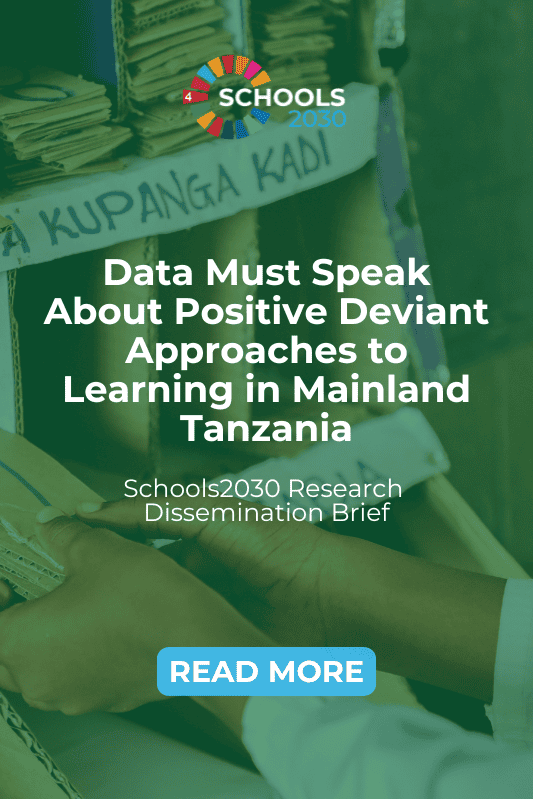
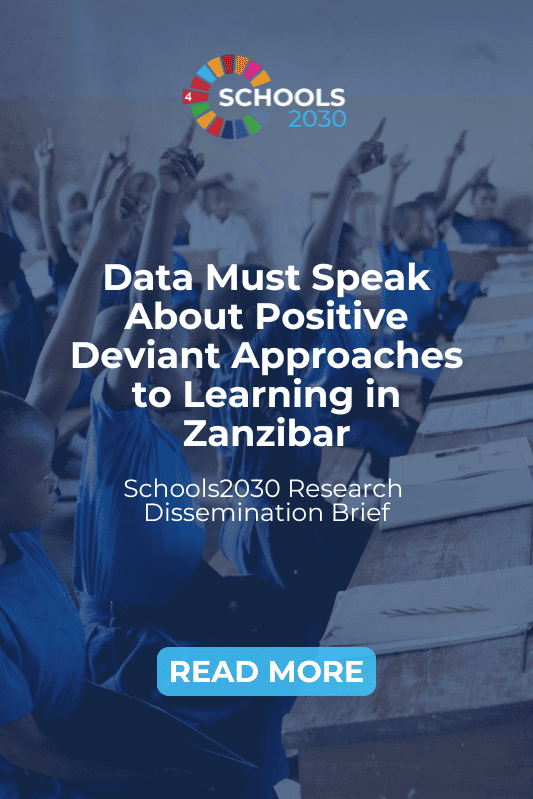
Helping Teachers Reduce Inequality in Education
SUMMARY
The coronavirus pandemic has exacerbated pre-existing inequalities between students from poor or working-class backgrounds and students from middle-class or affluent backgrounds. Far-reaching school closures have impacted billions of learners worldwide and Covid-related disruptions have caused dramatic learning losses, especially among students from disadvantaged backgrounds. Teachers therefore need support now more than even to help reduce inequality in education. The primary interest of this project was in exploring students’ beliefs, such as their beliefs about intellectual ability, which influence students’ motivation, learning, and achievement in school, so that teachers can target these beliefs to improve students’ engagement and ultimately reduce inequality.
Projects 2022-2024
The Schools2030 Global Call for Research 2022 sought projects that would explore the links between Human-centred Design, action research and educational equity, as well as support our understanding of the extent to which our focus on holistic learning outcomes supports learner variability and those with learning differences.
Action research and equity: effects on innovative school environments
SUMMARY
This research presents evidence-based solutions for promoting equity in education, specifically in the field of human-centred design and similar action research approaches. The project addressed the following problem: do action research processes in innovative schools participating in the Schools2030 programme generate more equitable effects concerning gender, ethnicity and disabilities among students? The specialised literature does not provide abundant information regarding the impact of action research in tackling inequalities within schools, an aspect to which this project intends to contribute. Results collaborated in verifying the hypothesis that action research processes are associated with changes in the school environment in favour of equity in gender, ethnicity, and disabilities between students. The knowledge produced provides subsidies to educational leaders in the field of teacher training.
Holistic learning for SEND students in Uganda primary schools
SUMMARY
This research focused on understanding the effect of teacher-student relationships (TSRs) in the perception of self-efficacy of SEND students in Ugandan primary schools. It explored how TSRs affect students’ engagement and performance in other Holistic Learning (HL) dimensions (literacy, numeracy, empathy, self-efficacy, problem-solving) through a design-based implementation research. The overall goal was to ensure equity in education for students with special educational needs or disabilities (SEND). Holistic learning outcomes are not a nice-to-have. Particularly for SEND students, self-efficacy is a gateway to other learning outcomes. The research questions focused on the role that TSRs have on empathy and self-efficacy and how self-efficacy influences performance on the three remaining HL domains of literacy, numeracy, and problem-solving. The results from this study can inform teacher practices and ultimately offer more equitable opportunities for SEND students to thrive in school and access better opportunities in the future.



More
EPub
- For Windows users: eKitabu e-reader free from Microsoft Store
- For Android users: eKitabu App free from Google Play Store
- For Macbook and iPhone users: Apple Books (pre-installed) or PocketBook reader
Mixed-Methods Research to Develop a Values-Alignment Approach for Holistic, Growth-Oriented Teaching Practices in Pakistan
INSTITUTE(S):
PI/CO-PI:
David Yeager
Shwetlena Sabarwal (Co-PI)
GEOGRAPHY:
Pakistan
SUMMARY
What is values alignment and why is it needed? Values alignment is a persuasive approach rooted in people’s assets and most profound motivations, such as a desire to be respected and admired. It stands in contrast to more deficit-focused approaches (e.g. the “Nudge” tradition), which tend to focus on teachers’ cognitive biases and limitations. Values alignment works by framing the desired behaviour in terms of how it serves a core value that a person shares with an important social reference group (e.g., teachers in Pakistan). Such re-framing imbues the relevant behaviour with a sense of motivational priority by linking it with people’s strong drive to live up to the (often tacit) standards they share with their peers (or other important social reference groups) about what constitutes a person worthy of respect and admiration in their social milieu. This study has co-developed, with Schools2030 teachers, a values-aligned framework that can inspire teachers in Pakistan to make holistic teaching practices a top priority.
Projects 2023-2025
We are excited to work with six Global Research Partners appointed through the Schools2030 Global Call for Research 2023. The projects are helping build understanding on how we should consider teacher agency and its relation to education innovation in different contexts, as well as support our learning on how quality learning environments impact students’ holistic learning outcomes.
Teacher Agency and Innovation in Tanzania (TAIT): Exploring and Advancing Change
INSTITUTE(S):
PI/CO-PI:
Dr. Matthew A.M. Thomas
Dr. Halima Mgumia
GEOGRAPHY:
Tanzania
SUMMARY
Teacher agency and innovative teaching practices are posited as vital to improving holistic learning outcomes for children. However, little is known about how these concepts are understood, linked, and mobilised to enhance educational quality and equity. Further research is essential, particularly in contexts like Tanzania where the system is highly fragmented and teachers’ work is tightly controlled, and secondary education is especially paramount to transitions to work and/or higher education. This project aims to: a) explore how stakeholders in Tanzania understand teacher agency and innovation, including their enablers and constraints and potential relationships; b) investigate differences in perceptions across stakeholders, if any; and c) cultivate research-practice synergies for future change across levels.
How does agency translate into action? Understanding the mechanisms of teacher agency and well-being in Uganda
PI/CO-PI:
Dr. Nikhit D’Sa
Martin Ariapa
GEOGRAPHY:
Uganda
SUMMARY
Teacher agency is under-defined and under-studied in the majority-world, even though we have consistent evidence from high-resource contexts that agency is related to stronger student academic and social outcomes. Additionally, it is unclear how teacher agency overlaps and interacts with similar constructs (like teacher well-being) or how teacher agency translates into action in low-resource contexts where teachers have limited external supports. Our study aims to address these gaps in the extant research about teacher agency, focusing on Uganda. Working with teachers from Schools 2030 schools, we are mapping the challenges and opportunities they identify in implementing human-centred design principles in their classrooms, using this map as a way to construct a definition of agency. We are using this teacher-constructed definition to choose and adapt an existing measure(s) of teacher agency. Finally, we are surveying teachers from 30 Schools 2030 primary institutions to (a) establish the psychometric properties of the adapted teacher agency measure, (b) understand the relationship between teacher agency, teacher well-being, and action in the school, and (c) explore the relationship between teacher agency and student learning and development.
Teacher agency as a driving force of educational change in Kyrgyzstan
SUMMARY
This research proposal focuses on investigating the role of teacher agency in driving educational change in Kyrgyzstan, particularly within Schools2030. The study aims to address the challenges faced by human-centred design teams in implementing child-centred educational practices and understand how teacher agency influences the success of these initiatives. The context in Kyrgyzstan presents a unique challenge, as the role of teachers has been devalued over the years due to political, economic, and social transitions. The study also takes into account the historical influence of the centralised Soviet educational system and the need for educational reform in Kyrgyzstan, which has struggled with low educational outcomes. The intended impact of the study is to produce evidence on teacher agency in the educational institutions participating in Schools2030 in Kyrgyzstan to inform future activities of the programme to enhance their relevance, effectiveness, and impact.
Teacher Agency and Innovation: mixed methods study on systemic factors driving teacher capability in low-resource contexts
PI/CO-PI:
Dr. Jwalin Patel
Dr. Mansi Nanda
Dr. Seema Nath
GEOGRAPHY:
India
SUMMARY
Our research, exploring teacher agency, focuses on the role of teachers as agents of change in India’s educational landscape. Within the educational landscape, teachers are increasingly recognised as agents of change. This recognition aligns with the broader program goals of Schools2030, which seek to foster holistic and inclusive learning environments. Our study explores the various elements of teacher agency, examining how teachers experience it and how it relates to their ability to innovate in the classroom. We are investigating the systemic enablers and constraints that influence teacher agency and their capability to create holistic and inclusive learning environments. By adopting the Human Capability Approach (HCA) and Complex Systems Theory (CST), we aim to understand the complex network of influences affecting teachers’ capabilities and practices, focusing on individual teachers’ identities and agency while considering systemic effects.
Emboldening pre-primary teachers with data to reflect and improve their classroom practices
SUMMARY
Using evidence-based practices such as reading to children, giving them free choice in play, and inclusively engaging individual children in preprimary classrooms can lead to positive impacts on children’s learning and wellbeing. However, even with curricula and training, preprimary teachers are not consistently engaging in many practices that we know support children’s learning. We are conducting a randomized trial to understand how engaging Kenyan preprimary teachers in Mombasa with Brief Early Childhood Quality Inventory (BEQI) classroom observational and self assessment data can improve quality classroom practices. We are examining whether providing direct feedback to teachers and encouraging them to set goals based on that feedback can lead to improved teaching practices. We are exploring how feedback and encouragement to improve affects teachers’ self-perceptions, and how this may be related to their teaching practices.
Quality education for all – strengthening tools and practices to support disability-inclusive learning environments in early childhood development and education (ECDE) settings in Kenya
INSTITUTE(S):
PI/CO-PI:
Dr. Julia De Kadt
Sheru Muuo
Lydia Kairanya
GEOGRAPHY:
Kenya
SUMMARY
This participatory action research aims to strengthen tools and guidance to support early childhood development and education (ECDE) teachers in ensuring disability-inclusive learning environments in Kenya.
Sightsavers and the Kenya Institute of Special Education (KISE) seek to explore how the Schools2030 inclusive learning environment tools and guidance, including the Basic Early Childhood Quality Inventory (BEQI) can be made more disability-inclusive: how disability inclusion can be better integrated in the tools, how they perform in real school settings, and how the tools support teachers in making disability-inclusive adaptations to learning environments and teaching practice. We are also exploring the relationship with teacher agency in responding to disability-inclusion needs and assess what is needed for the broader adoption of the tools and guidelines in ECDE settings in Kenya.

